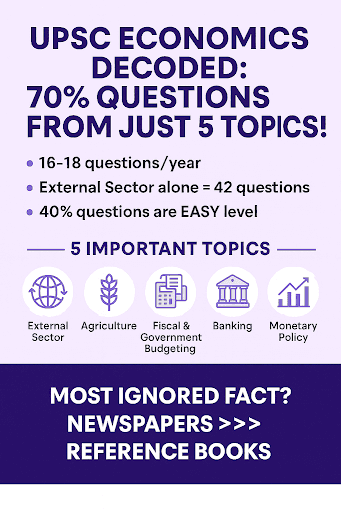UPSC Economy Strategy : PYQ-Based Strategy for Prelims 2026
8 min read
Nov 03, 2025

UPSC Economics: A Data-Driven Strategy from 10 Years of Prelims Papers (2015-2024)
Indian Economy is not just another subject in the vast UPSC syllabus; it's a cornerstone of the Prelims paper. But with a syllabus that seems to overlap with everything under the sun, how do you prepare smartly? How do you focus on what truly matters?
Instead of generic advice, we decided to let the data do the talking. We conducted a detailed analysis of every Economics question from the UPSC Prelims papers from 2015 to 2024. The results are in, and they provide a crystal-clear roadmap to mastering this high-scoring subject.
This is your ultimate strategic guide to preparing for the Indian Economy.
Why You Can't Ignore Economics: The Big Picture
Before we dive into the topics, let's understand the battlefield.
Heavy Weightage: On average, 16-18 questions have appeared from Economics each year for the last decade. That’s a potential of 32-36 marks that can make or break your chances of clearing the cutoff.
Balanced Difficulty: The good news? It's not as tough as it seems. Our analysis shows that roughly 40% of questions are easy, 35% are of medium difficulty, and only about 25% are truly difficult. With strong conceptual clarity, you can comfortably attempt a majority of the questions.
Highly Scoring (If Done Right): Unlike subjects heavy on memorization, Economics rewards a deep understanding of core concepts. This means that a solid foundation allows you to logically deduce answers even for questions you haven't seen before.
Where to Focus Your Energy: A Topic-wise Breakdown (2015-2024)
So, where do the questions actually come from? We broke down a decade of papers to identify the highest-yield areas.
The Golden Rule: The data reveals a clear pattern. A staggering 70% of questions are rooted in Macroeconomics. Your preparation must be laser-focused here.
Here are the top 10 most crucial topics, consolidated for a smarter study plan:

Key Takeaway: Master the top 5 areas—External Sector, Banking, Fiscal Policy, Monetary Policy, and Agriculture—and you have covered the heart of the Economics syllabus for UPSC Prelims.
Decoding the UPSC Mindset: The Nature of the Questions

Knowing what to study is only half the battle. Knowing how it will be asked is the key.
Conceptual Questions (High Priority): These test your fundamental clarity. Can you explain what 'Legal Tender Money' is or how 'Fiscal Deficit' is calculated? Your core understanding is non-negotiable.
Application-based Questions (High Priority): These are the game-changers. UPSC won’t just ask for the definition of the Repo Rate; it will ask what happens to the economy if the RBI increases it. This requires you to apply static concepts to dynamic situations.
Current Affairs-linked Questions: This is where the magic happens. Newspapers are the single largest source of question themes. A static concept like the 'Insolvency and Bankruptcy Code' (IBC) will likely be asked when it’s frequently in the news. The Union Budget and Economic Survey are not just documents; they are question papers in disguise.
Your Ultimate Toolkit: The Best Sources for Economics Prep
Based on our analysis, a minimalist and focused approach to sources works best.
Foundation (The Bedrock):
NCERT Class 11: Indian Economic Development
NCERT Class 12: Introductory Macroeconomics
Advanced Understanding (Pick ONE):
A single standard reference book like those by Ramesh Singh or Sanjiv Verma. Use it selectively to fill gaps, not cover-to-cover.
Current Affairs (The Deal Clincher):
The Union Budget & Economic Survey (Latest): These are non-negotiable. Make crisp notes on key terms, schemes, and trends.
A Quality Newspaper: The Hindu or The Indian Express.
Reference Websites: RBI website (for monetary policy), Investopedia, Arthapedia.
The Game Plan: Your 7-Step Action Plan for Success
Build Your Base: Start with NCERTs. Do not touch any reference book until your foundation is rock-solid.
Master the Core: Dedicate maximum time to the high-yield topics identified above. Know concepts like CRR, SLR, Repo Rate, Fiscal Deficit, BoP, and MSP like the back of your hand.
Link Static with Dynamic: This is the most crucial skill. When you read about the Monetary Policy Committee (MPC) in the newspaper, immediately revise your static notes on monetary policy. This active linkage is the secret sauce.
Decode Budget & Survey: Don't just read them. Focus on the 'why' behind the government's policies and allocations. These documents reveal the economic priorities of the nation, which is a goldmine for question setters.
Make Smart Notes: Use mind maps for conceptual topics (e.g., Inflation) and one-page summaries for factual topics (e.g., Government Schemes). This will make revision lightning-fast.
Revise Relentlessly: Economics is conceptual. You need at least 3-4 revisions to internalize the links between topics and be able to apply them under pressure.
Practice with Purpose: Mock tests are your reality check. Take at least 7-8 full-length subject mock tests. Analyze every mistake, especially in application-based questions.
Turn Strategy into Score
Knowing the strategy is the first step. Executing it is what gets you on the final list. A data-driven plan needs a powerful tool for implementation.
Ready to put this blueprint into action? The best way to master these concepts, link them with current affairs, and test your application skills is through consistent, targeted practice.
Download the PrepAiro app now! Access thousands of practice questions curated from these high-yield topics, take mock tests that simulate the real exam, and get daily current affairs updates that connect the news to the syllabus.
Stop studying hard. Start studying smart.